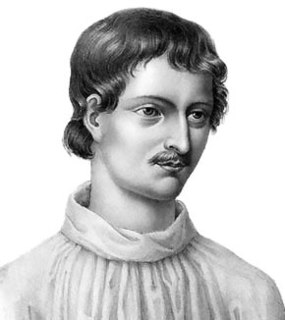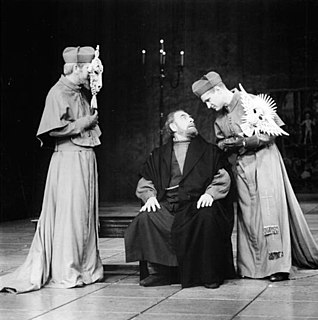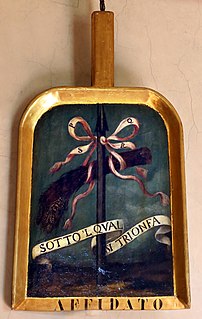 W
WThe Galileo affair began around 1610 and culminated with the trial and condemnation of Galileo Galilei by the Roman Catholic Inquisition in 1633. Galileo was prosecuted for his support of heliocentrism, the astronomical model in which the Earth and planets revolve around the Sun at the centre of the universe.
 W
W"And yet it moves" or "Although it does move" is a phrase attributed to the Italian mathematician, physicist and philosopher Galileo Galilei (1564–1642) in 1633 after being forced to recant his claims that the Earth moves around the Sun, rather than the converse. In this context, the implication of the phrase is: despite his recantation, the Church's proclamations to the contrary, or any other conviction or doctrine of men, the Earth does, in fact, move.
 W
WGiordano Bruno was an Italian Dominican friar, philosopher, mathematician, poet, cosmological theorist, and Hermetic occultist. He is known for his cosmological theories, which conceptually extended the then-novel Copernican model. He proposed that the stars were distant suns surrounded by their own planets, and he raised the possibility that these planets might foster life of their own, a cosmological position known as cosmic pluralism. He also insisted that the universe is infinite and could have no "center".
 W
WCesare Cremonini, sometimes Cesare Cremonino, was an Italian professor of natural philosophy, working rationalism and Aristotelian materialism inside scholasticism. His Latinized name was Cæsar Cremoninus. or Cæsar Cremonius.
 W
WThe Dialogue Concerning the Two Chief World Systems is a 1632 Italian-language book by Galileo Galilei comparing the Copernican system with the traditional Ptolemaic system. It was translated into Latin as Systema cosmicum in 1635 by Matthias Bernegger. The book was dedicated to Galileo's patron, Ferdinando II de' Medici, Grand Duke of Tuscany, who received the first printed copy on February 22, 1632.
 W
WGalileo di Vincenzo Bonaiuti de' Galilei, commonly referred to as Galileo, was an astronomer, physicist and engineer, sometimes described as a polymath, from Pisa, in modern-day Italy. Galileo has been called the "father of observational astronomy", the "father of modern physics", the "father of the scientific method", and the "father of modern science".
 W
WMelchior Inchofer or Imhofer, in Hungarian: Inchofer Menyhért was an Austrian-Hungarian Jesuit. He played an important part in the trial of Galileo, by his arguments, later published in his Tractatus Syllepticus, that Galileo was an advocate of the Copernican system. His role in the Galileo affair is being reassessed in the light of fresh documentary evidence.
 W
WLife of Galileo, also known as Galileo, is a play by the 20th century German dramatist Bertolt Brecht with incidental music by Hanns Eisler. The play was written in 1938 and received its first theatrical production at the Zurich Schauspielhaus, opening on the 9th of September 1943. This production was directed by Leonard Steckel, with set-design by Teo Otto. The cast included Steckel himself, Karl Paryla and Wolfgang Langhoff.
 W
WVincenzo Maculani was an Italian Catholic Cardinal, inquisitor and military architect. He was known as a severe man, harsh and without compassion, who preferred the black cappa of his order to the brighter purple he was later entitled to wear as a cardinal.
 W
WGiovanni Francesco Sagredo was a Venetian mathematician and close friend of Galileo. He was also a friend and correspondent of English scientist William Gilbert. He is remembered today mainly because he appears as one of the figures in Galileo's controversial work the Dialogue Concerning the Two Chief World Systems (1632).
 W
WFilippo Vincenzo Romolo Salviati was an Italian nobleman, scientist and friend of Galileo. He is remembered today mainly because he appears as one of the figures in Galileo's controversial work the Dialogue Concerning the Two Chief World Systems (1632).
 W
WThe Discourses and Mathematical Demonstrations Relating to Two New Sciences published in 1638 was Galileo Galilei's final book and a scientific testament covering much of his work in physics over the preceding thirty years. It was written partly in Italian and partly in Latin.